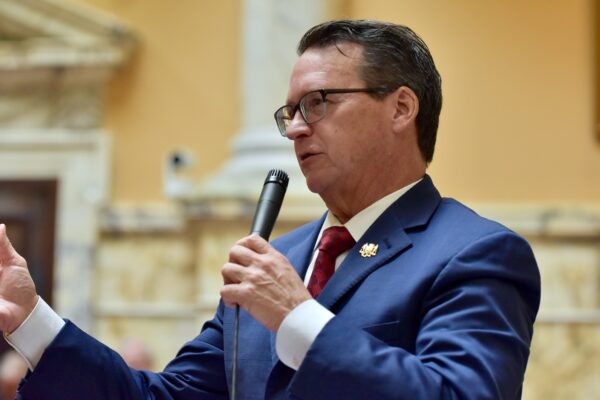
As the full state Senate takes up a measure that would put reins on the state’s 25-year-old deregulated electricity marketplace, big energy companies opposing the legislation have appealed to Gov. Wes Moore (D), arguing the bill is “anti-consumer, anti-business, and anti-environment.”
The Senate on Tuesday began debate on Senate Bill 1, which would place new requirements on energy companies that want to compete with established utilities by selling gas and electricity to Maryland consumers. The bill’s chief sponsor, Sen. Malcolm Augustine (D-Prince George’s) told his colleagues that SB 1 is “a significant consumer protection and cost of living bill.”
What the legislation primarily aims to do is crack down on bad actors who have come into the market and prey on vulnerable consumers, particularly in poor neighborhoods, selling contracts for energy that wind up costing more than if the customers had relied on the monopoly utilities to provide the gas and electricity.
“This is targeted by zip codes, into our lower-income neighborhoods, and it’s intentional,” said Augustine, who described witnessing some of the energy contract salespeople at work in his district.
But electricity retailers, which include some of the biggest energy companies in the country, have long maintained that the salespeople seeking to defraud consumers represent only a tiny percentage of the marketplace, and that SB 1 is an overreaction that would effectively kill competition in Maryland.
About a fifth of the state’s electric customers buy power from suppliers rather than their utilities, preferring perceived savings, clean energy offers or other incentives. If ratepayers choose not to shop for an electricity supplier, the utilities become the default energy supplier in a system that has become known as standard offer service.
In a State House where monopoly utilities like BGE, Pepco and Washington Gas and their lobbyists hold great sway with lawmakers, the arguments of energy companies like NRG, Vistra and Constellation have generally fallen on deaf ears, and SB 1 and the House equivalent, House Bill 267, are considered likely to pass this year. The House measure is sponsored by Del. Brian Crosby (D-St. Mary’s), the vice chair of the House Economic Matters Committee and chair of that panel’s utilities subcommittee.
So with the legislature expected to move on those bills, the big energy suppliers are now turning to Moore, who has not weighed in on the bill, to help. Just as senators were beginning debate on the bill late Tuesday morning, a spokesperson for the energy industry’s Choose Who You Use Coalition was circulating a letter that 10 companies sent to Moore earlier in the day, urging him to oppose the legislation.
The letter — signed by executives from NRG Energy, Genie Energy, Constellation, IGS Energy, American Power & Gas, Vistra, Just Energy, Indira Energy, CleanChoice Energy, and Tomorrow Energy — uses unusually combative language to suggest that SB 1 and HB 267 are at odds with Moore’s goals of making Maryland a climate leader and with his desire to aggressively market Maryland to the business world. They also implied, without saying so directly, that they could pull out of the state if the legislation becomes law.
“The legislation reflects a misapprehension of the energy industry, and well-established business practices of companies that have responsibly served Maryland consumers for many years. Above all it does not reflect your goals for Maryland,” the executives wrote. “If you sign this bill, Fortune 500 companies, like NRG and Constellation, as well as many other reputable suppliers like the undersigned, will view the Maryland consumer market as essentially closed for business. Ironically, in an attempt to clean up the market, the legislation could simply leave it with only the worst actors.
“This bill irreparably harms Maryland’s ability to meet legislatively mandated 2050 climate goals, and your agenda to attract more innovation and business investment to Maryland. It also sends a clear message to the almost 500,000 Maryland customers that currently shop that their preferences are irrelevant and that their energy supply service will be re-monopolized under orders from the state. They will know that their choices are of no consequence. What will Maryland choose for them next?”
The executives go on to suggest that by allowing the bill to become law, Moore would be setting back the state’s energy market “by 100 years,” and they request a meeting with them.
Carter Elliott IV, a spokesperson for Moore, said Tuesday the administration had yet to decide whether to support the Augustine-Crosby legislation.

Sen. Stephen S. Hershey Jr. (R-Upper Shore). Photo by Bryan P. Sears.
On the Senate floor Tuesday, Minority Leader Stephen S. Hershey Jr. (R-Upper Shore), also expressed some skepticism about Augustine’s bill.
“I think we’re taking away too much opportunity in retail choice,” he said.
Hershey asked Augustine about proposed pricing levels that would require electric retail companies to offer consumers rates that reflect the average costs of electricity in the previous year. Augustine replied that this practice was recently adopted in New York State.
“All it is is just basic math,” he said, suggesting that the policy may be saving New York ratepayers money. “They’re looking backwards.”
But Hershey saw other consequences.
“I understand that the retail choice program is crumbling” in New York, he said.
After several more minutes of questions, Hershey asked that the debate be cut off and resumed on Wednesday, so senators have more time to absorb the legislation and possibly prepare amendments.
“Complicated issue, complicated issue,” Senate President Bill Ferguson (D-Baltimore City) said.
"electric" - Google News
March 06, 2024 at 06:48PM
https://ift.tt/JLP7Iuq
Energy companies appeal to Moore as bill modifying electric deregulation begins to move - Maryland Matters
"electric" - Google News
https://ift.tt/a8uNnIU
https://ift.tt/dEKViav
No comments:
Post a Comment